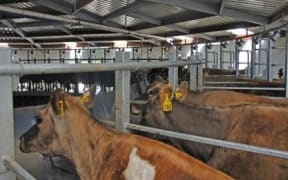Farmers in the Lake Rotorua catchment fear their businesses may become unprofitable when rules to help clean-up the lake are brought in.

Photo: 123RF
Bay of Plenty Regional Council is in the process of consulting landowners to help them draft rules around nitrogen run-off into the lake.
The plan will mean that farmers and some small block holders will have to reduce stock numbers to meet set individual targets.
The regional council wants to reduce nitrogen getting into the lake to 320 tonnes a year, down from the 755 tonnes that seeps into the lake.
Dairy farmer Gisele Schweizer represents the Lake Rotorua Primary Producers Collective. She said under an early proposal, dairy farmers were expected to reduce nutrient run off by 50 percent by 2022, which would have meant the end of dairying in the area.
The figure now suggested is 35 percent by 2032 - which Ms Schweizer said would give dairy farmers a fighting chance of survival.
"It is still going to be a very tough battle or road a head of us if they do remain as currently drafted in the proposed rules."
Ms Schweizer said the economic impact on the region from a reduction in productivity would be huge.
"It is not certain at all that the current rules will allow all pastoral farmers to stay viable, and in fact it is quite probable that not everybody will stay viable under any of the possible variations of the rules, but it is about finding the best of a bad bunch."
Landowners will have to meet an allocation to reduce nitrogen on their particular property, and the final formula for this is yet to be decided.
The Protect Rotorua group represents mainly deer farmers and some small block owners.
Spokesperson Sharon Love said while there was no dispute over the need to clean up the lake, the process the council was following was unfair.
"I sat through meetings since October, and it is ridiculously confusing, and it shouldn't be, because if it becomes ridiculously confusing and if it is completely unfair - well, no one is going to comply and all we are going to end up with is more rates costs when they can't enforce it."
Graham West is a small block owner with 20-hectares running dairy grazers.
He said until the nitrate discharge allowance was decided on for each property, the impact was still unclear.
"In a general sense, those that have been running intensive systems will probably have to cut back and run less stock. Those that have been running a fairly extensive system and have reasonable areas of trees and forests etcetera on it will probably be ok."
The Bay of Plenty Regional Council said the community had made it clear the lake needed to be cleaned up and the cost had to be shared.
The council said it was still working on the figures, but it was looking like about 43 percent from farmers and the rest from public initiatives, such as encouraging land-use changes.
The council's environmental delivery manager, Warwick Murray, said the nitrogen rules would target farmers and rural landowners.
"It will give each farmer an allocation of nitrogen that they can be allowed to lose, and with that will go a need for the bigger ones, the farm nutrient plan which says, 'okay, how are they actually going to achieve that'."
He said once the landowner received an allocation, it would be up to them to work out how to do it, although the council would provide advice if wanted.
"But it is up to them to come up with a plan for how they are going to do that, and basically what we will (need to) do is we will agree with them on what that plan says."
Mr Murray said if landowners failed to come up with a plan then enforcement procedures would be in place to deal with that.
"Mechanisms for formal compliance will be in place but that is an awful long way down the track."
He said the council was aiming for 2017 to implement the rules if the resource management process was not appealed to the Environment Court.



